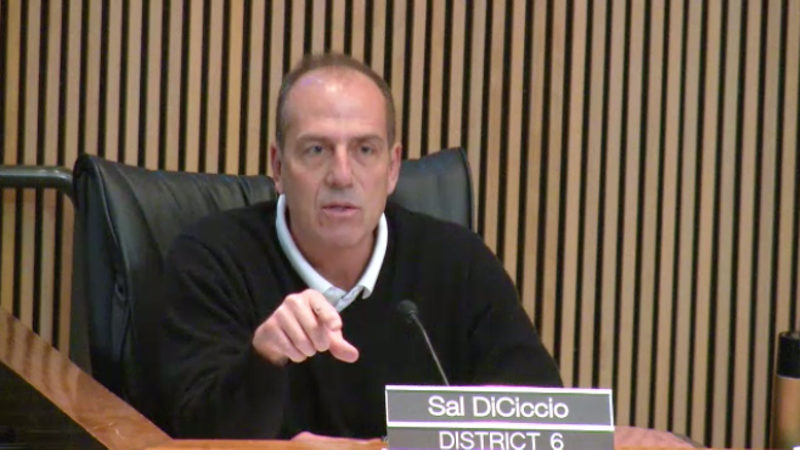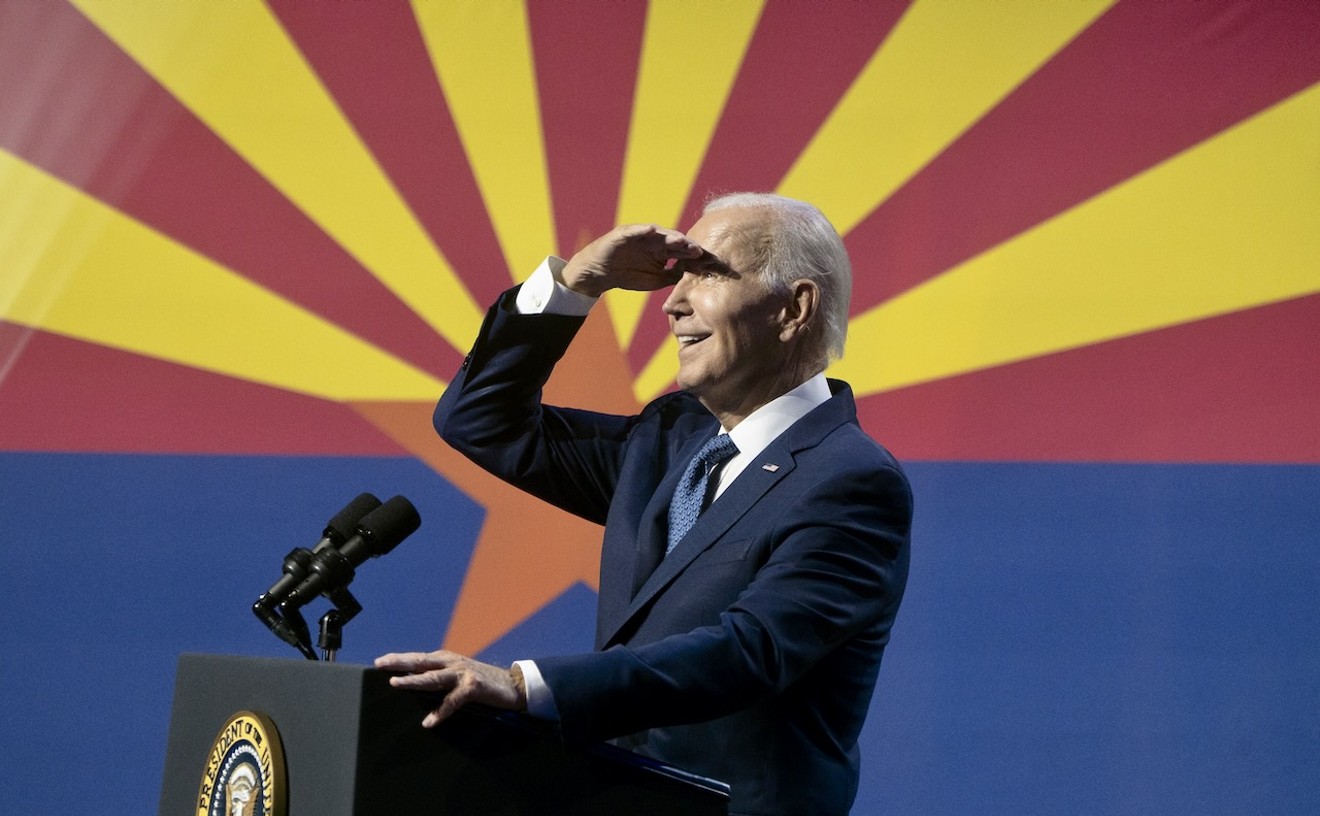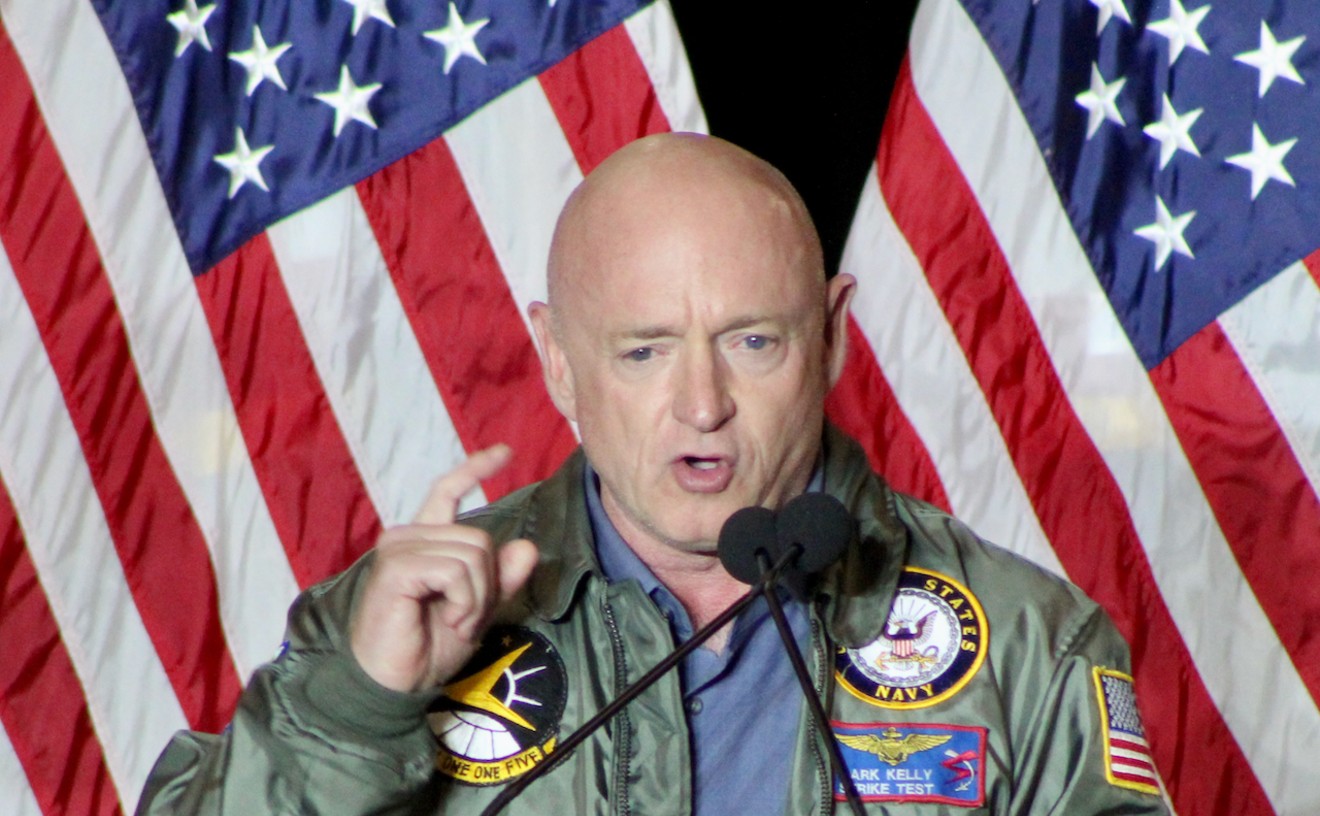Two right-wing political consultants with a penchant for parachuting into local political campaigns across the United States are behind Councilman Sal DiCiccio's "citizen" initiative for pension reform in Phoenix.
Allow us to introduce Tim Mooney and Chuck Warren, who run two political consulting firms with differing names, operate from the same headquarters in Cheyenne, Wyoming, and share a history of questionable campaign tactics.
"This is [Chuck's] and my idea, working with Sal DiCiccio," Mooney, the managing partner of Silver Bullet Group, told Phoenix New Times by phone on Friday. Warren was his business partner, Mooney said, and DiCiccio, the District 6 councilman, has been "a friend for a long, long time."
Warren, managing director of September Group, offered a slightly different version of the story, suggesting that DiCiccio followed Mooney and Warren's lead in the pension-reform initiative. "Tim and I came up with this idea, boy, three or four years ago,” he said. "We brought Sal on."
Whether DiCiccio was there from the beginning, the initiative did not originate among voters and Phoenix residents. Instead, as special interests have done for decades, Mooney, Warren, and DiCiccio exploited a process intended for voters and residents to pursue the legislative changes they want in their city.
Mooney and Warren have a documented history of being paid to work the ballot-initiative system in other states, typically for conservative causes.
In this case, however, they and DiCiccio funded the campaign to reform Phoenix's pension system. They contributed tens of thousands of dollars to Responsible Budgets, the political action committee they oversee that was dedicated to landing pension reform on a Phoenix ballot. Through the committee, they spent some $157,000 on signature-gathering companies from outside Arizona.
This kind of operation contradicts the spirit of the citizen initiative, which Phoenix city literature calls "a power reserved to the voters to propose legislation." If Phoenix residents want to change or repeal a city charter or code, and they can gather enough signatures on a petition to do so, either the city council has to adopt the change or the issue has to be put to a vote.
Phoenix City Clerk Denise Archibald certified the pension-reform initiative last Wednesday. At least 20,510 — the minimum required — of the purported 49,554 submitted signatures were valid, Archibald wrote in a Certificate of Sufficiency.
The initiative should appear on the ballot during Phoenix's special elections on August 27, 2019. If voters pass it, the initiative would change city charter by requiring Phoenix to use almost all excess revenue from the general fund to pay down the city's pension debt. It would also kill pensions for elected officials, among other changes.
In an email release on Thursday, DiCiccio described Responsible Budgets as "the citizen initiative" to fix Phoenix's "looming pension crisis." The city has $4 billion in pension debt.
The initiative progressed in two stages. The first iteration, which began when the petition was filed in January 2018, failed. DiCiccio called it off in August 2018, reportedly because he did not think enough of the 31,000 signatures gathered by then were valid. Phase Two began in November, relaunched after the midterm elections.
"So far, Chuck and I and Sal have put the money up to get this to the ballot," Mooney said. Campaign-finance filings support this statement.
Overall, the campaign cost nearly $160,000, according to its most recent campaign finance report. A little more than $98,000 of that came from Pass the Balanced Budget Amendment, a company whose current secretary is Sam Stone, Sal DiCiccio's chief of staff, and which was incorporated by Chuck Warren in 2011.
Stone said the company was created years ago to work on ballot initiatives that were related to budget issues at the state level. He claimed that he hadn't done anything with the company "in a couple of years," though his name was on its most recent corporate filings with the Arizona Corporation Commission.Silver Bullet "conducted the worst petition drive in the history of the State of Michigan." — Protecting Michigan Taxpayers
tweet this
The remaining $60,000 in contributions came from Morning in America, which has an address in Scottsdale but is registered in Wyoming, at the same address as Silver Bullet Group and September Group.
Campaign-finance filings and other records show that the committee funneled some of that money back to its own connections, and spent the rest on paid signature-gatherers.
In November, when the second round of the signature-gathering commenced, Responsible Budgets paid $1,100 for the "communications" services of Halifax Strategies. The Atlanta-based company was founded by a man named Joshua Jones, who is an adviser to Warren's September Group and a director for Pass the Balanced Budget Amendment.
That month, Responsible Budgets also paid $15,000 to a California-based, Colorado-licensed signature-gathering company called Let the Voters Decide.
The bulk of the committee's spending, however, went to L and R Political Consultants, a firm in Palm Harbor, Florida. Responsible Budgets spent $142,000 for what its November campaign finance filings labeled vaguely as "consulting." Finance records from a previous spending period offer a more concrete explanation, "paid for petition signatures," via the circuitous and dodgy history of a man named Larry Laws.
In February 2018, during the first, failed phase of the initiative, Responsible Budgets paid Laws, whose address was in Palm Harbor, just south of $32,000 to gather signatures. During the initiative's second phase, the committee's financial records did not explicitly list Larry Laws or "paid for petition signatures." Instead, its money went to L and R Political Consultants, whose director is Steven Larry Laws and whose address is in Palm Harbor, Florida.
It's unclear whether the Larry Laws who gathered signatures for Phoenix's ballot initiative is the same Larry Laws named in a 2003 Los Angeles Times story about petition-peddlers. Public records indicate they could be the same person, based on age.
In that story, then-46-year-old Larry Laws and his girlfriend said they roamed the country selling spatulas and wrinkle creams at fairs and marketing credit cards. Laws also coordinated petitions for ballot initiatives.
"Easy money," Laws told the Los Angeles Times back then. New Times' attempts to reach Laws by phone and email were unsuccessful. (New Times was able to reach Laws after this story published. His statement can be found at the bottom of the story.)
All of which brings us back to Silver Bullet Group and September Group, the right-wing political consultancies of the two men who organized the charge to pay an associate, as well as out-of-staters like Larry Laws to gather signatures for what, under ideal circumstances, would be a local, citizen-led, grassroots initiative in Phoenix.
Ironically, Silver Bullet Group calls itself "one of America’s most successful grassroots political firms."
Among its signature achievements, according to the company's website, are gathering 2.8 million signatures for four referendums in California in just 49 days — that comes out to an astounding 57,143 signatures per day — and collecting 114,000 signatures in two weeks to recall a mayor in Florida.
It also partnered with other firms, Silver Bullet's website says, to kill a potential soda tax in Portland, Oregon, and to effectively force Seattle's City Council to reverse a head tax on giant corporations, including Amazon.
On Mooney's LinkedIn resume, descriptions of campaigns similarly impart a distinctly conservative flavor, on issues like right-to-work and "definition of marriage."
That page also describes Mooney as "a nationally respected independent political consultant with extensive experience working with some of America’s most powerful trade associations, largest corporations, and most recognizable elected officials.""Tim and I came up with this idea, boy, three or four years ago.” — Chuck Warren
tweet this
Groups that have hired Silver Bullet, though, haven't always been thrilled with its service.
In 2015, Protecting Michigan Taxpayers paid the company to collect signatures for a ballot initiative in Michigan. It hoped to repeal a state law requiring that construction workers earn union wages on state-funded or state-sponsored projects.
After Silver Bullet oversaw the collection of about 390,000 signatures for the petition, state officials ruled that tens of thousands of them were duplicates. In 2016, Protecting Michigan Taxpayers sued Mooney and Warren, as principals of Silver Bullet, for breach of contract and unjust enrichment by the two men, plus civil fraud by Mooney.
Silver Bullet "conducted the worst petition drive in the history of the State of Michigan," the lawsuit alleged, the Detroit Free Press reported at the time. In November 2016, Protecting Michigan Taxpayers and Silver Bullet settled the lawsuit for an undisclosed amount. The Michigan legislature ultimately repealed the law in 2018.
Warren's September Group casts itself as "known for unconventional thinking when it comes to planning a winning path." It adds, "Our team of seasoned strategists brings centuries of collective experience."
Asked for comment about the lawsuit in Michigan, Warren said, "This is a hit piece by Phoenix New Times. There was a lawsuit that was settled." He added, "We didn't collect the signatures, we paid for the signatures."
Mooney lives in Cave Creek, which borders Phoenix. Warren called himself a part-time Phoenix resident. Asked if he paid Phoenix taxes, he said, "My wife does."
Both Mooney and Warren said that the initiative was their attempt to get voters to pay more attention to looming pension issues in Phoenix. Enacting pension reform in Phoenix could be "the first step toward doing this in other places," in Arizona and across the country, Mooney said.
DiCiccio did not respond on Friday to a request for comment about the origins of this ballot initiative. Stone, his chief of staff, said he believed DiCiccio was unavailable because he was playing golf.
UPDATE: Larry Laws, reached by phone Monday, said he paid people two to three dollars per signature gathered. He estimated that 90 percent of those were locals from Phoenix, or maybe Scottsdale, and elsewhere in Arizona. The other 10 percent, he said, were probably “people who worked for me” who’d come in from outside the state. He confirmed that he was the person in the 2003 LA Times article.
“I certainly have nothing to hide, and certainly have not been doing anything illegal,” Laws said. “I believe in the right to put things on the ballot. And yes, I make money on it, and I think it’s great.”











